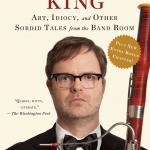This is a post written for far fewer readers than normal — and perhaps far more. It’s a post meant for any and all who teach: whether you teach in a high school or Sunday School, college or Confirmation, to people in early childhood or late adulthood, this post is for you.
It’s a post that, unusually for me, is meant not to complicate, but to inspire — at a moment when most of those who teach are preparing to restart work that is at once fulfilling and frustrating, energizing and exhausting. And it’s a post that I’ll offer in two forms.
Why We Teach (short version)
You’re busy writing syllabi and lesson plans, picking books, holding meetings, etc. You’re already remembering that there’s not enough time in the day for this kind of work.
But please set aside 90 distraction-free minutes to watch a new documentary film produced by my Bethel colleague Sam Mulberry. It’s called Why We Teach, and simply consists of fifteen excellent teachers talking about, well, why (and how) they teach. Just trust me: it will inspire and sustain you for the year to come.
Why We Teach (longer version)
If you need a bit of convincing that this is a good use of your scarce time…
Why We Teach is the result of Sam’s spring 2018 sabbatical. He invited all the recent winners of Bethel’s Faculty Excellence Award for Teaching to sit down with him for an interview. Fifteen of us took him up on that offer. (Full disclosure: I was one of them.) Sam then edited together clips from those sessions with stock footage of school teachers and students — in a narration-free style inspired by the great documentarian Errol Morris.
I know it sounds unlikely, and I know I’m biased, but believe me: the end result is incredibly powerful. (For a deeper dive into how Sam made the movie, check out his podcast interview with our colleague Chris Moore.) I came home from the premiere in late May and admitted on my personal blog that
I found myself on the verge of tears for more than half the movie.
…coming at the end of a year of financial and existential crisis at Bethel and many other universities like it, this film communicated so clearly the fragile importance of what we do. It left me feeling like I was on the knife’s edge between two futures:
One in which this film serves as a curiosity, an artifact of a Bethel — at least as we know and love it — that no longer exists.
The other in which this film serves as a cornerstone, the first brick laid in the foundation of a new Bethel that… learned how it needed to change and how it needed to stay the same.
I shared that post on Facebook and soon saw this comment from Sara Misgen, a Bethel alum who is now completing her doctorate in theology. It’s worth quoting in its entirety:
I finally got a chance to watch this today and I also found myself on the verge of tears for most of it. Now, I rarely find myself nostalgic for Bethel, but this film got at the heart of what I loved about that place, and what I still love about it. I loved that my professors took an interest in me as a person, that they make space in their busy days to listen to the stories of their students, as so many of the teachers of this film point out. I love that my life was changed through their courses, that I’m still in contact with so many of you five years after my graduation. Bethel taught me about how teachers can be co-learners, and that seminars teach more than just information.
When I get development mailings from Bethel, they often assume that I miss broomball, meals in the DC, or chapel. And frankly, five years out, I don’t really miss those things. But I miss my professors. I miss being in a place where I can critically engage faith questions alongside things like science and literature. I miss the liberal arts nature of the university, where I found mentors among profs in my own BTS [Biblical and Theological Studies] department, but also the history, psychology, and philosophy departments. And I miss the sort of attitude towards teaching, students, and learning that comes forward in this documentary. It’s special, and it’s one of the reasons I’m glad I went to Bethel and want it to continue to exist. (Even as I theologically differ from Bethel in some fundamental ways).
I’m at Yale now, and there are gifts and riches and benefits to this place that are hugely important. But I cannot imagine any faculty person here saying that they wish they had published less in hopes of spending more time with students. I can’t imagine anyone offering me a key to their office so I could have dedicated study space (something 3 different Bethel profs did for me while I was there!) We’re not really taught to teach – if you want to have any formalized instruction in that, you have to add a certificate with another long list of requirements to your PhD – because it’s assumed we’ll be researchers. Even among my undergrads, there’s a push to specialize in ways that make me worry that they’re losing the liberal arts element that shaped me as a person and scholar. Bethel’s distinctiveness isn’t in the campus, in the buildings, or even in some of its more obscure traditions. It’s in the relationships of faculty and students, and I’m so glad to see that was captured here.
And I heard similar things from much older alumni. They hadn’t ever taken a class with me or most of the others interviewed, yet still recognized their experience in what those fifteen professors had to say. That speaks powerfully to the enduring ethos of teaching at a college whose longest-serving president once wrote that
We believe that in the end the impact of one life upon another is probably greater than the impact of an idea or a method of teaching or a favorable physical setting…. At Bethel we want our young people to enter into personal contact with their teachers, and we hope to keep such academic paraphernalia as the curriculum, course credits, class hours, and examinations from getting in the way of this relationship.
So even if you don’t teach at Bethel, or a Christian liberal arts college, or any college at all… If you teach 3-year olds or 33-year olds… Watch this film to be reminded of what you already know:
That, in spite of all the ways that American society gets education wrong, what you do matters.
That the impact of your life on those of your students can make a difference, even to the point of something we can only call transformation.
That your most dismal, frustrating day — when you doubt your school, your students, and yourself most of all — is not wasted time.
For, as artist Ken Steinbach says in the film’s final scene, “There are no useless gifts.”
If the film isn’t enough… Sam also placed the full, original interviews on a website. Here’s mine, in the unlikely event that you want to spend another 68 minutes watching a temporarily bearded version of me jabbering away about higher education. There’s also a searchable database of shorter clips on topics like the liberal arts, relationships with students, and the art, craft, and science of teaching.













